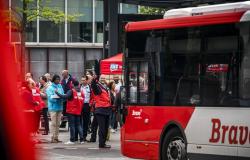Artificial intelligence is increasingly used in, for example, writing Sinterklaas poems, dating or cancer detection. The use of AI is also becoming increasingly common in job application procedures. But there are snags to that.
Uit onderzoek van vacaturesite Indeed blijkt dat veel werkgevers in sollicitatieprocedures al kunstmatige intelligentie gebruiken om het kaf van het koren te scheiden. Momenteel wordt al 10 procent van de cv’s gecheckt door AI.
Sollicitanten gebruiken op hun beurt ook kunstmatige intelligentie. Zo’n 24 procent maakt bij het solliciteren gebruik van AI, bijvoorbeeld om een motivatiebrief te schrijven.
Woordvoerder Stan Snijders van Indeed noemt dat een positieve ontwikkeling. “Het voorproces van een sollicitatie kost veel tijd en moeite. Als je dat kunt automatiseren, hou je meer tijd over voor andere dingen.”
Aangezien AI de processen kan versnellen, liggen er veel kansen. Zo kan kunstmatige intelligentie mensen echt sneller aan een baan helpen. Maar er kleeft ook een nadeel aan, waarschuwt Snijders. “AI wordt aangedreven door data. Data zijn afkomstig van mensen en mensen hebben vooroordelen. We zijn dus bang dat als er vooroordelen zitten in de data waar de AI van leert, de AI ook bevooroordeeld is.”
Ontvang meldingen bij belangrijk nieuws over kunstmatige intelligentie Stay informed with notifications
AI classifies jobs by gender and skin color
News agency investigation Bloomberg shows how those biases are passed on to AI. A bot tasked with creating images of workers in different industries showed mostly white male workers in images of doctors, lawyers and other high-paying jobs.
In contrast, the generated images of lower-paying jobs mainly featured female and black workers. Even when the AI bot was instructed to create images of prisoners, drug dealers and terrorists, it reinforced existing stereotypes.
Prejudices seem inevitable
Because AI learns from us, it is virtually impossible to make artificial intelligence free of biases, says Djurre Das, researcher at the Rathenau Institute. “Just like humans, technology is not perfect. So we must remain critical of it.”
According to Das, if you use AI when choosing a new employee, there is a danger that you will end up with more of the same. For example, the technology is then asked to look at the current well-performing staff and to base that on what the new employee must meet.
But what do you have to give the technology to avoid getting more of the same? “That’s the big question,” says Das. “If you ask a computer to give you what you don’t have, I’m curious to see what comes out of it.” In that case, you turn the prejudices that people and technology have into something positive, Das believes. “So not more of the same, but more of the different. That can offer positive outcomes.”
Can artificial intelligence prevent major forest fires?
Not more of the same
The question remains how you do that. In the past it has often been found that people with a non-Dutch surname are less likely to be invited for a job interview.
But even if you teach AI not to look at the names of applicants, the technology can still disadvantage people with a migration background in the selection process, Das knows.
“If the computer sees, for example, that many successful people in a certain field have studied public administration, it can select accordingly. Suppose that public administration is a very white study program, then more white people will still be hired,” the researcher explains. “Then the prejudices are still not resolved.”
Yet both Snijders and Das think that AI can improve the application process. “AI can help people find a job. If that process can become more efficient through AI, it will help the employee and the employer,” says Snijders.
“But an application process is in fact also a process between people, the employee and the employer,” Das adds. “It’s a kind of dating: you find out whether you feel comfortable with the other person. That human aspect is very important and we must preserve it.”
Tags: job applications stay critical Economy






